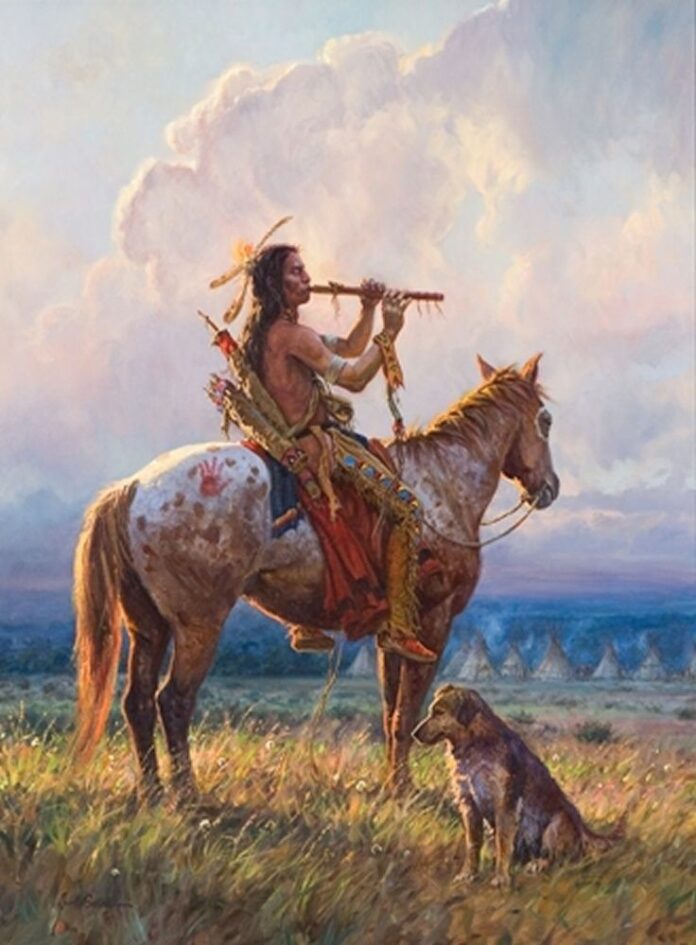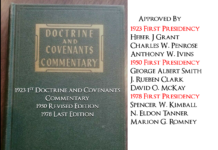A Quote from Sitting Bull
“Inside of me there are two dogs. One is mean and evil and the other is good and they fight each other all the time. When asked which one wins I answer, the one I feed the most.”
– Sitting Bull

Note: This quote is similar to a Cherokee legend in which “An old Cherokee is teaching his grandson about life.
‘A fight is going on inside me,’ he said to the boy.
‘It is a terrible fight and it is between two wolves. One is evil – he is anger, envy, sorrow, regret, greed, arrogance, self-pity, guilt, resentment, inferiority, lies, false pride, superiority, and ego.’ He continued, ‘The other is good – he is joy, peace, love, hope, serenity, humility, kindness, benevolence, empathy, generosity, truth, compassion, and faith. The same fight is going on inside you – and inside every other person, too.’
The grandson thought about it for a minute and then asked his grandfather, ‘Which wolf will win?’
The old Cherokee simply replied, ‘The one you feed.’”
(Above) One of the most important non-LDS books which supports the Heartland Book of Mormon geography! Old World Roots of the Cherokee: How DNA, Ancient Alphabets and Religion Explain the Origins of America’s Largest Indian Nation, by Dr. Donald N. Yates
Book of Mormon- Which Urging do we Feed?
“For the natural man is an enemy to God, and has been from the fall of Adam, and will be, forever and ever, unless he yields to the enticings of the Holy Spirit, and putteth off the natural man and becometh a saint through the atonement of Christ the Lord, and becometh as a child, submissive, meek, humble, patient, full of love, willing to submit to all things which the Lord seeth fit to inflict upon him, even as a child doth submit to his father.” Mosiah 3:19
“Ye cannot say, when ye are brought to that awful crisis, that I will repent, that I will return to my God. Nay, ye cannot say this; for that same spirit which doth possess your bodies at the time that ye go out of this life, that same spirit will have power to possess your body in that eternal world.” Alma 34:34
Native American Culture

They believed the spirit of the animals would live on in spirit within the tribe. They also fashioned totem poles carved out of wood with different animals faces on them, and these faces represented the spirits of family and important tribal figures. In Native American culture they believed that everyone person had the spirit of a certain animal and when they died their spirit would live on inside the animal. The Native Americans also harvested plants and berries that they would use for various things from medicines to dyes. They lived in harmony with the Earth which they lived on and they let nothing go to waste.
Native American Pow Wow
Native American culture goes back thousands of years; to a time when these indigenous people lived in what is now known as North America. Native American culture revolved heavily around nature, and every aspect of their lives was based around the Earth. The Native American tribes worshipped the spirits of these animals as gods, but they also killed them for food and clothing. They would never waste any part of the animals though, they would eat the meat, wear the hides, they used the skin to make drums and they used the bones for tools and weapons.

Native American Totem Pole
Thousands of years ago there were over ten million Native Americans living within the territory that is now the United States. (See the area in green on the map below). The Native American cultural traditions varied among the thousands of different tribes that were spread throughout the land. Soon settlers started arriving on the shores of the Native American homelands and started pushing the Native American Indians from their homes and eventually off of their tribes land. The European settlers made their new homes on the Native Americans land and interfered with the Native American culture that had relatively lived in peace until now. When the European settlers arrived here they brought with them many diseases from Europe that killed many Native Americans and many more tribes were forced from their lands. Eventually the United States government set aside land for the Native Americans, and many of these Indian reservations are still around today. (See how few on the map below) There are still signs all over the country of the great Native American culture that once ruled these lands, and Native American art and fashions are more popular than ever.

What does it mean that the spirit is willing but the flesh is weak?

Just before His arrest, Jesus was in the Garden of Gethsemane, and He said to His disciples, “Watch and pray so that you will not fall into temptation. The spirit is willing, but the flesh is weak” (Matthew 26:41). The command came after Jesus had been praying to the Father and had found the disciples sleeping instead of praying (verses 38–40). He had admonished them to stay awake and pray with Him, but “their eyes were heavy” (verse 43), and they kept falling asleep. They slept right up until the time the armed mob came to take Jesus away (verses 45–47).
Because “the spirit is willing but the flesh is weak,” the disciples were caught unawares in Gethsemane. The word for “spirit” in this passage is the Greek word pneuma, which in this context refers to the soul of man or the mind. The word for “flesh” refers to the human body and nature, with its moral and physical frailties. When Jesus first found the disciples sleeping, He said to Peter, “Couldn’t you men keep watch with me for one hour?” (Matthew 26:40), and then afterward told them all to watch and pray in order to avoid temptation.

The disciples’ spirits were willing to do what was right. In fact, just a few minute earlier, all of them had pledged their lives to Jesus: “Peter declared, ‘Even if I have to die with you, I will never disown you.’ And all the other disciples said the same” (Matthew 26:35). But, as it turned out, they couldn’t even pray with Jesus for any length of time. Their flesh was weak. They fell asleep because of their physical human weakness. They were tired. By affirming that “the spirit is willing,” Jesus was saying that He knew the disciples wanted to stay awake and pray, but the weakness of the flesh had overpowered the spiritual desire to pray and watch. Jesus was not scolding them but exhorting them to beware of the weakness of the flesh. The Lord Himself was fighting the same struggle against the flesh, but He had overcome it (verse 39).

The story of the disciples in Gethsemane rings true for all of us. We can so easily be distracted from prayer, worship, or a kind act by hunger, exhaustion, sexual desire, feeling too cold or too hot, thirst, pain, and even a persistent itch. The flesh shouts loudly when it wants something, and the ruckus it makes can easily drown out the desires of the spirit. Even when the spirit is willing to do whatever God asks, the flesh remains weak. The answer is just as Jesus said: watch and pray. What does it mean to watch and pray? How can that help us succeed against the weaknesses of the flesh?
Prayer is straightforward. We know that we can ask God for whatever we need. Jesus made a special point that whatever we ask “in His name” He will do (John 14:13). The phrase in His name means “according to His will.” Is having the strength to obey, to worship, to do what is right and true according to God’s will? Of course! Jesus will answer the prayer for spiritual strength to overcome the flesh. When we feel the weakness of the flesh about to overpower us, we can always pray.
Watchfulness is the other weapon we have against the weakness of the flesh. The apostle Paul said, “No temptation has overtaken you except what is common to mankind. And God is faithful; he will not let you be tempted beyond what you can bear. But when you are tempted, he will also provide a way out so that you can endure it” (1 Corinthians 10:13). We should watch for the “way out.” Spiritual watchfulness sees the temptation coming and prompts prayer. The fact that the flesh is a natural ally to temptation makes spiritual alertness all the more important. “The prudent see danger and take refuge, but the simple keep going and pay the penalty” (Proverbs 22:3).

The spirit of a believer is willing to follow God, but the flesh is weak. The demands, desires, and fears of human nature can pull us way off track. Satan has set up the world to appeal to the weaknesses of the flesh: lust, greed, gluttony, and other sins are directly related to the demands of the body. Is it any wonder that almost every advertisement you see and hear speaks to the fulfillment of the lust of the flesh? Another weakness of the flesh is the fear that we will not be taken care of. But Jesus spoke to this fear too: “I tell you, do not worry about your life, what you will eat or drink; or about your body, what you will wear. Is not life more than food, and the body more than clothes? Look at the birds of the air; they do not sow or reap or store away in barns, and yet your heavenly Father feeds them. Are you not much more valuable than they?” (Matthew 6:25–26).
The spirit is willing, but the flesh is weak. All believers know the struggle. But when we watch and pray—when we remain spiritually alert and appeal to God for help—we can find strength in the time of need (see Psalm 46:1 and Hebrews 4:16). And when we fail, “we have an advocate with the Father—Jesus Christ, the Righteous One. He is the atoning sacrifice for our sins, and not only for ours but also for the sins of the whole world” (1 John 2:1–2). Source

More Quotes About Dogs
There are similar stories to the story of the Two Wolves that refer to dogs instead of wolves.
The earliest known variation of this story was published by the Baptist pastor John R. Bisagno in the book The Power of Positive Praying (Xulon Press, 1965). In this version, a missionary is told by a Mohave Indian convert named Joe that he has a black dog and a white dog always fighting inside him, and that the dog which Joe feeds the most will win.[16][17]
In I’m a Good Man, but… (1969), Fritz Ridenour writes: “A supposedly true story from the mission field pretty well sums it up. The missionary was talking to the old Indian about what it was like to be a Christian and the Indian said that being a Christian was like having two dogs inside of him fighting. There was the bad dog (sin) and the good dog (righteousness). ‘Which is winning?’ asked the missionary. ‘The one I feed the most.'”[18]
In How to Win Souls and Influence People for Heaven (1973), George Godfrey recounts a tale where an Indian convert says that in his chest he has a white dog that wants to do good, and a black dog that wants to do bad, which are always fighting with each other. After the missionary asks which one wins, he says that the one that he feeds wins.[19]

In The Presbyterian Journal, Volume 34 (1975), George Aiken Taylor writes: “[…] two dogs fighting in the soul. ‘Which one will win?’ asked the convert. ‘The one you feed the most,’ answered the missionary.”[20]
A later variation of this story was published by the Reverend Billy Graham in his book The Holy Spirit: Activating God’s Power in Your Life (W Publishing Group, 1978) about an Inuk with a black dog and a white dog that he used for match fixing by only feeding the one he wanted to win.[21]

The 1998 book Experiencing the Soul: Before Birth, During Life, After Death, by Eliot Rosen, uses the story to conclude the first chapter: “A Native American Elder once described his own inner struggles in this manner: ‘Inside of me there are two dogs. One of the dogs is mean and evil. The other dog is good. The mean dog fights the good dog all the time.’ When asked which dog wins, he reflected for a moment and replied, ‘The one I feed the most.'”[22][23]
In the 2003 film The Missing, set in 1885 New Mexico Territory, the following dialogue occurs: “‘Inside you are two dogs. One is evil, the other is good. The mean dog fights the good dog all the time.’ ‘Which one wins?’ ‘I don’t know. Whichever one I feed the most.'”






